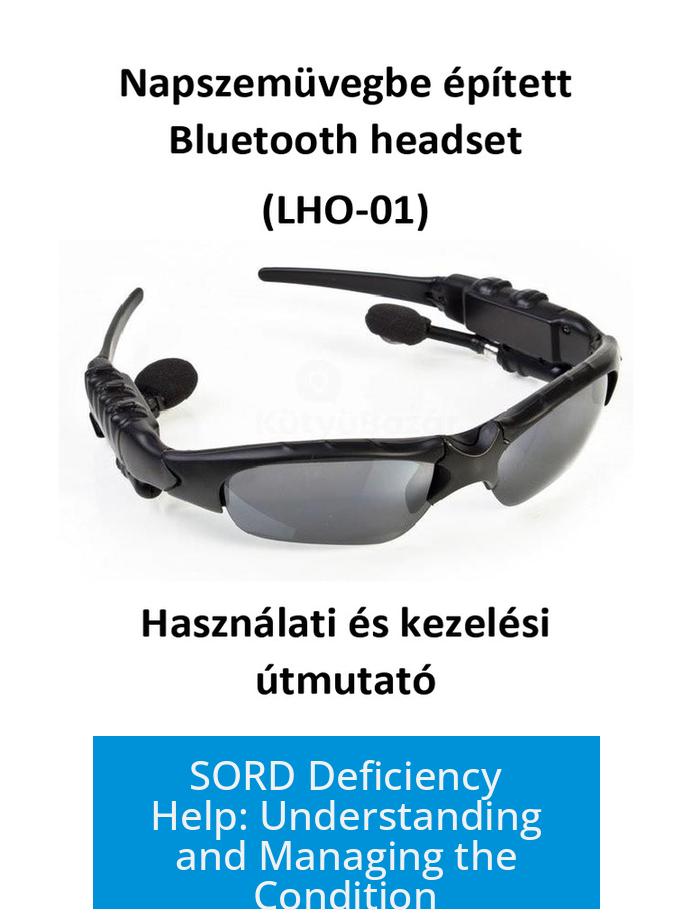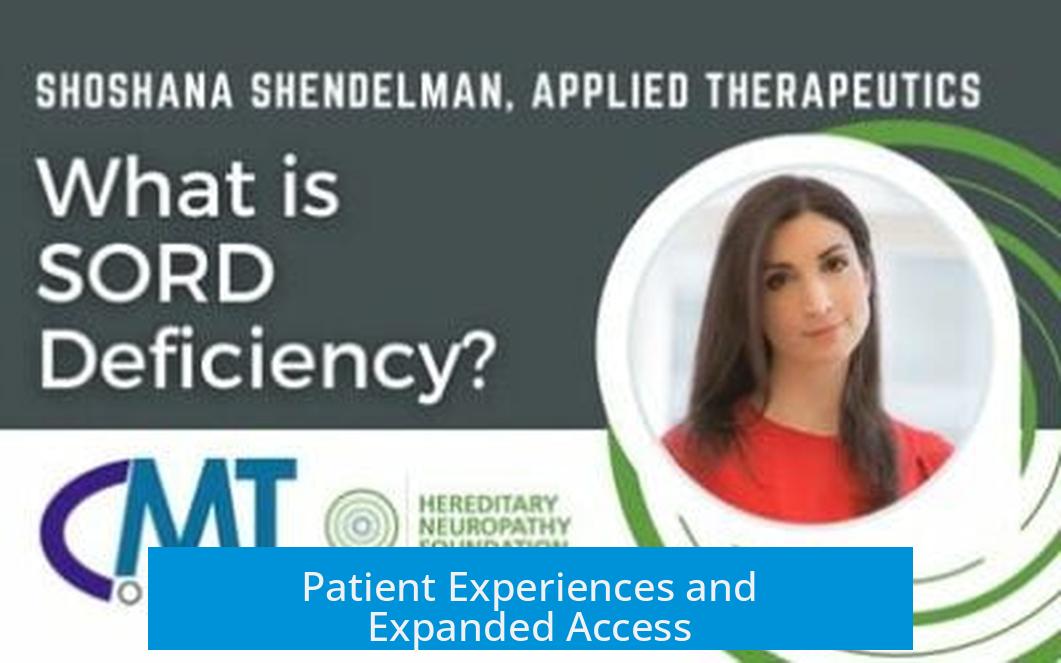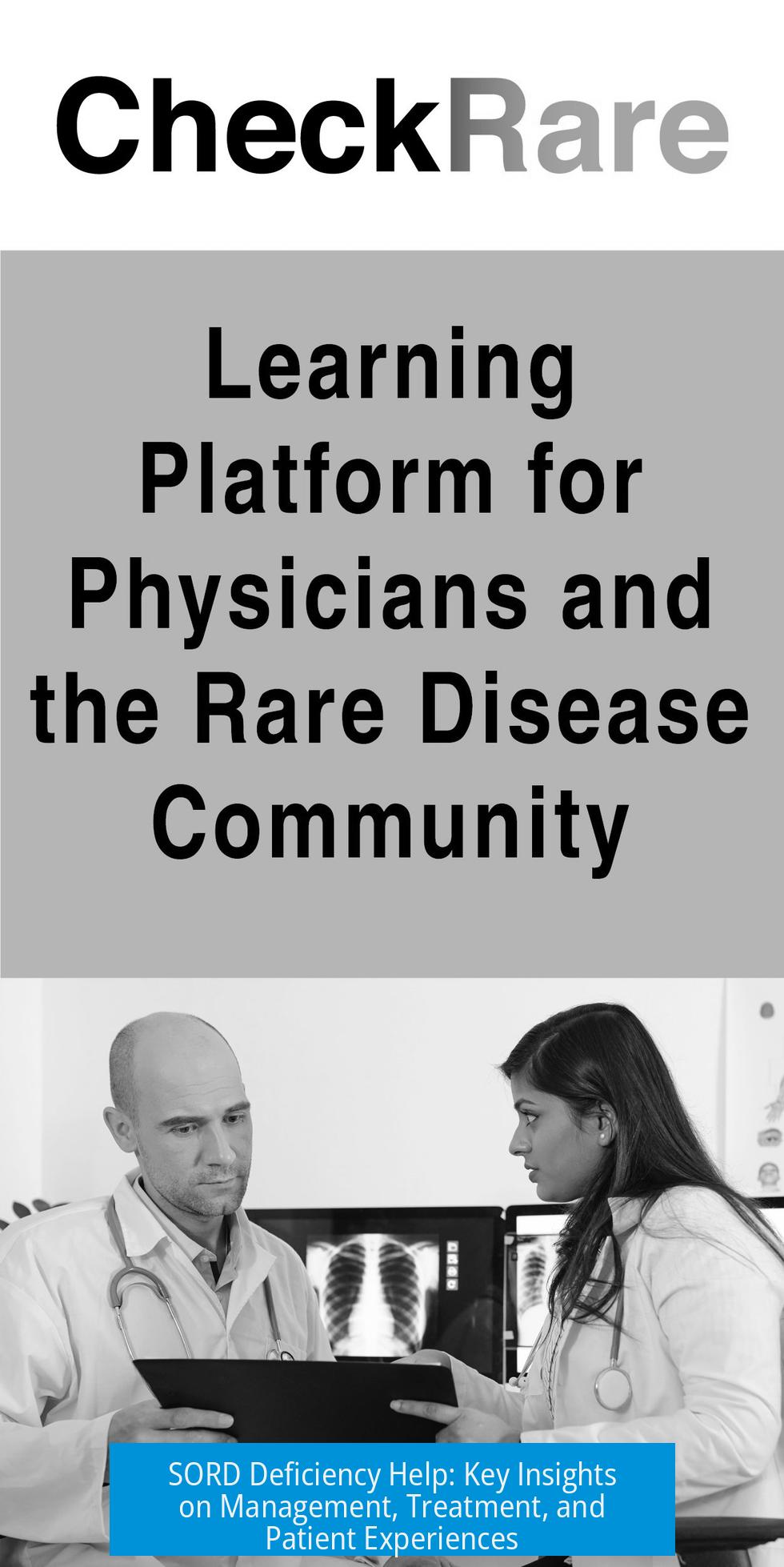SORD Deficiency Help: Understanding and Managing the Condition

SORD deficiency is a metabolic disorder caused by a lack of the enzyme sorbitol dehydrogenase (SORD), which normally converts sorbitol into fructose in the body. This disruption leads to sorbitol accumulation, causing symptoms like neuropathy. Understanding the enzyme’s role and available treatments aids in managing this condition.
Role of SORD in Metabolism
SORD catalyzes the oxidation of sorbitol to fructose, a critical step in glucose metabolism. Glucose converts into sorbitol via aldose reductase, and then SORD processes sorbitol further. When SORD is deficient, sorbitol builds up in tissues, particularly nerves, contributing to nerve damage similar to diabetic neuropathy.
Treatment Approaches
- Aldose Reductase Inhibitors: Experimental treatments target aldose reductase to reduce sorbitol production. These inhibitors show promise in vitro but remain unapproved for human use.
- Dietary Modifications: Limiting dietary glucose can reduce sorbitol formation. Patients benefit from avoiding added sugars and sorbitol-containing foods, resembling diabetic dietary management. However, diet alone likely cannot resolve symptoms.
Research and Clinical Trials
Research advances are underway to develop therapeutic options. A notable study is detailed in the paper available here. Clinical trials are in progress, with collaboration between the Hereditary Neuropathy Foundation (HNF) and Applied Therapeutics preparing for a phase 3 trial of the drug AT-007 (govorestat).
Patients interested in testing or trial enrollment can contact related foundations or Applied Therapeutics for guidance and potential participation.
Patient Experiences and Expanded Access

Patients previously diagnosed with Charcot-Marie-Tooth disease type (CMT) may discover they have SORD deficiency after genetic testing. AT-007 is available via Expanded Access, offering symptomatic relief. Users report improvements in tremors, extremity warmth, and balance within months of treatment.
Those diagnosed with CMT-SORD unable to join clinical trials are advised to seek Expanded Access programs through the manufacturer.
Important Considerations
- This information is based on current research and patient reports; medical advice should come from qualified physicians.
- Rapid symptom progression can be distressing, underscoring the need for early diagnosis and treatment exploration.
Key Takeaways
- SORD deficiency impairs sorbitol-to-fructose conversion, leading to nerve damage.
- Treatment options include aldose reductase inhibitors (experimental) and dietary glucose control.
- Clinical trials for AT-007 (govorestat) are ongoing; Expanded Access is available.
- Patient involvement in trials and foundation support improves awareness and care.
SORD Deficiency Help: What You Need to Know Now
Ever stumbled upon the term SORD deficiency and felt like you’d landed on a different planet? You’re not alone. SORD deficiency relates to a rare metabolic hiccup involving the enzyme sorbitol dehydrogenase, or SORD for short. Simply put, this enzyme helps convert sorbitol, a sugar alcohol, into fructose, a common sugar our bodies can use for energy.
So what happens if SORD doesn’t do its job? Sorbitol piles up where it shouldn’t, causing symptoms similar to other neuropathies like Charcot-Marie-Tooth disease (CMT) and even diabetes-related nerve issues.
Understanding SORD and Its Role

Think of SORD as the traffic cop directing sorbitol to the fructose lane. It plays a middle role in a two-step metabolic process. First, glucose converts into sorbitol through an enzyme named aldose reductase. Then SORD takes over and turns that sorbitol into fructose.
When SORD is deficient or missing, sorbitol clogs the metabolic highway. That buildup potentially damages nerves, which leads to symptoms like hand tremors, numbness, and balance problems.
The Treatment Puzzle: What Works and What’s Still Up in the Air
Here’s the tricky part: No FDA-approved treatment specifically targets SORD deficiency yet. Researchers are exploring options, but we don’t have miracle cures yet.
One promising approach involves aldose reductase inhibitors. Since aldose reductase creates sorbitol from glucose, inhibiting it could reduce sorbitol buildup. In lab studies (in vitro), this shows promise, but human trials are pending.
Dietary tweaks also help. Cutting down on glucose intake means your body makes less sorbitol to begin with. So, adopting a sugar-conscious diet—similar to managing diabetes—may ease symptoms. And absolutely avoid products with sorbitol as a sweetener; adding fuel to an already burning fire is never a good idea.
That said, don’t get your hopes up that diet alone will fix everything. SORD deficiency is complex. While diet helps, it’s not a guaranteed cure.
Research and Clinical Trials: On the Horizon
For those who want to dive deeper into the science, a key research paper is available here: Genetic Insights into SORD Deficiency. It provides the cutting-edge understanding researchers are building on.
Meanwhile, the Hereditary Neuropathy Foundation (HNF) is teaming up with Applied Therapeutics to prepare for a phase 3 clinical trial. This is exciting news: phase 3 trials test the safety and effectiveness of new drugs rigorously with larger groups.
If you think you or someone you know might have SORD deficiency, reaching out to HNF could connect you to this upcoming research. There’s even potential for testing right now through these groups.
Patient Experiences Offer Hope and Insight
Personal stories show the human side—beyond just dry science. For example, a patient recently diagnosed with SORD deficiency (previously labeled as untyped CMT) has a spouse taking an experimental drug called AT-007, or govorestat, under Expanded Access.
In just under six months on govorestat, improvements popped up: the patient saw reduced hand tremors, their hands and feet felt warmer, and balance issues diminished. These are significant wins for a condition that often feels like a slow decline.
Got diagnosed but missed the trial window? Don’t despair. Applied Therapeutics offers an Expanded Access program. It’s worth reaching out to inquire. If you ask, you might snag treatment access before formal approval.
A Few Words of Caution and Empathy
Here’s the disclaimer: this post is informational, not medical advice. Always consult with healthcare professionals before trying new diagnoses or treatments.
On a more personal note, living with a progressive condition like SORD deficiency can be terrifying. Strength fades faster than expected. This sense of loss and uncertainty is real—and shared by many.
So what’s the takeaway? SORD deficiency is a rare but real condition involving faulty sorbitol metabolism. While no definitive cure exists yet, research is moving fast. Inhibiting aldose reductase, dietary changes, and promising drugs like govorestat offer hope. Connecting with foundations and clinical trials can open doors to testing and treatment.
If you or a loved one is on this journey, remember: you’re not alone, and science is inching forward every day. The road might be bumpy, but there is light ahead.
- Key Advice: Avoid added sorbitol in foods, limit glucose intake, and consider talking to specialists about clinical trials.
- How to Take Action: Reach out to the Hereditary Neuropathy Foundation for testing.
- Look Ahead: Stay informed on new drugs like AT-007.
Questions? Curious about a diagnosis? Wondering how to change your diet to help? Drop a note to your care provider or the HNF liaison. Better understanding and early action could make all the difference.
What role does the SORD enzyme play in the body?
SORD converts sorbitol into fructose. This step follows glucose turning into sorbitol via another enzyme called aldose reductase. This conversion is part of a key metabolic pathway.
Can diet changes help manage SORD deficiency symptoms?
Limiting glucose intake might reduce sorbitol buildup. Avoid foods high in sugar and those containing added sorbitol. However, diet alone may not be enough to control the condition fully.
Are there any treatments currently available for SORD deficiency?
Aldose reductase inhibitors show promise in lab studies but have no approved human use yet. Some patients access experimental drug AT-007 through Expanded Access, showing symptom improvement.
How can someone with SORD deficiency get involved in clinical trials?
The Hereditary Neuropathy Foundation (HNF) works with Applied Therapeutics on upcoming trials. You can contact those groups to get tested or learn about Expanded Access programs.
What symptoms have improved for patients taking experimental treatments like AT-007?
Patients report reduced hand tremors, warmer extremities, and better balance. These signs suggest the drug may help ease nerve-related symptoms linked to SORD deficiency.





Leave a Comment